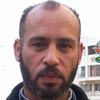B'Tselem 18 January 2007

‘Adnan a-Shtiyeh
I am a taxi driver. I run the route between our village and Nablus. Yesterday (Tuesday, 12 December), around 1:30 P.M., I got to the area known as al-Muhalal, about one kilometer from Nablus. There I encountered about eight army jeeps and an Israeli bulldozer. They were parked in the middle of the road, and nobody could pass.
Before dawn, an explosive charge laid by activists had blown up when an army jeep passed. When I got there, the bulldozer was digging in the road, which made it impossible to cross. Vehicles traveling from Tel toward Nablus took a hilly dirt road to get to the city. I preferred to wait for the soldiers to let me pass, because my car was new and I didn’t want it to get damaged on the beat-up bypass road.
Around 2:30, ‘Imad Salak, who was from my village, pulled up in his taxi. Isma’il a-Sifi, who was forty-four years old and also from my village, was sitting next to him. I was standing next to my car. I said hello to ‘Imad. He asked me to see if the soldiers would let him pass because ‘Isma’il, who had collapsed when he left the mosque and lost consciousness, had to get to the hospital. I asked Isma’il, “What’s up with you?” He did not respond, and he really seemed to be unconscious. I walked over to the first jeep, which was only some five meters from where I was. In Hebrew, I told the soldier who was sitting in the front passenger seat that a very ill man was in a car and had to get to the hospital urgently. He said that he would take a look. I went back to ‘Imad and told him what the soldier had said.
After about three to four minutes passed, three soldiers — the driver, the soldier I had spoken with, and a soldier who was in the back — got out of the jeep. They looked at Isma’il. It seemed as if they weren’t interested in him. They went back to the jeep, and I heard the soldier who was sitting next to the driver speak on the radio transmitter and say that they had a sick man. The voice on the radio transmitter said that it was forbidden to cross, sick or not. I told ‘Imad that he had to go by the bypass road, because they wouldn’t let him pass. He turned around and went via the bypass road.
I continued to wait until the soldiers finished digging the road, or until they would let me pass. I waited in vain until 3:30, and decided to go by the bypass road to get to Nablus. It took me about fifty minutes because I was concerned about my car and drove very slowly. When I got to a-Najah University Street, I saw Radi Salim. He, too, is a taxi driver from our village. He stopped and asked me about the road being blocked. I told him that soldiers still did not let cars pass. He told me that Isma’il had died. I was shocked. I told him that I had seen him at the roadblock, and that he had been taken to hospital via the bypass road to get there quickly. He said that Isma’il had died a few minutes before he reached the hospital, and that he had suffered an angina attack. The information made me very sad. If the soldiers had let him pass, the doctors might have been able to save his life. It takes only five to seven minutes to get to the hospital from where we were on the road.
About fifteen minutes later, Radi Salim called me to say that the soldiers had left the area and that I could get home by the regular route.
‘Adnan ‘Abd a-Latif Mustafa a-Shtiyeh, 30, married with five children, is a taxi driver and a resident of Tel, Nablus District. His testimony was given to Salma Deba’i in Nablus on 13 Dec. 2006.
Related Links